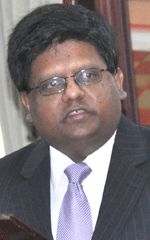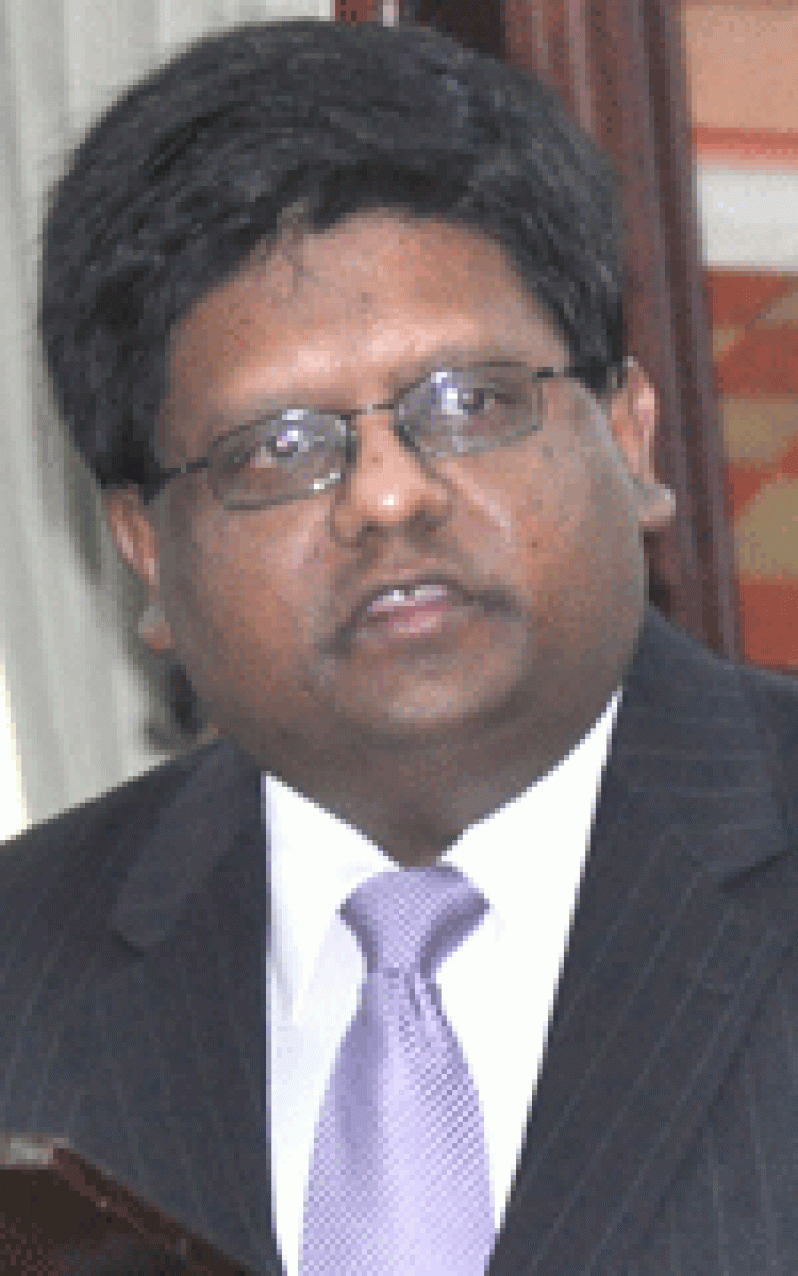FINANCE Minister Dr Ashni Singh has said the recent vote by the Opposition against the Amaila Hydropower project can only be viewed as an act of sabotage directed against national development and all right-minded Guyanese.
He further said in his address to the National Assembly Thursday that while the Opposition has been given every opportunity to stand up for nation building and collectively work towards improving the lives of every citizen, the AFC and APNU have chosen instead to play
political football with the issue at hand. “Why is it that this piece of Legislation did not receive the benefit of the support of the APNU and the AFC?” he asked of no one in particular, and, not expecting a response either, said: “It only can be described as a retaliatory vote…for the failed and thwarted attempt to frustrate the Standing Orders anddisrupt the sequence of business.”
“Why is it that this piece of Legislation did not receive the benefit of the support of the APNU and the AFC?” he asked of no one in particular, and, not expecting a response either, said: “It only can be described as a retaliatory vote…for the failed and thwarted attempt to frustrate the Standing Orders anddisrupt the sequence of business.”
According to a statement issued by his office late yesterday, “the Guarantee of Loans (Public Corporations and Companies) Act (CAP 77:01) was laid before Parliament on Thursday July 18 as part of a prerequisite for IDB funding of the Amaila Hydro Project.
“The Amendments to this Act are necessary in order to facilitate the implementation of the Power Purchase Agreement and to increase the amount of liability that can be guaranteed by the Government to an amount which shall not exceed G$150B.”
The Government of Guyana is providing Amaila Falls Hydro Inc. (AFHI), a special purpose company owned by Sithe Global, a performance guarantee on behalf of the Guyana Power and Light (GPL). The Guarantee’s purpose is to promote the implementation of the project.
During the course of his presentation, Minister Singh reportedly noted that given that the project itself has not had any significant objections from either the Opposition or government, he is rather surprised and disappointed that the Legislature has taken such a draconian approach “to kill a Bill” that has the potential to benefit the entire country.
“All of us in this House have at one time or another advocated the harnessing of Guyana’s hydropower potential, and indeed gone further to recognize the merits of the Amaila HydroPower Project,” he said, adding that it is for this very reason the projects’ failure to be realized is damaging to all Guyana, including AFC, APNU and PPP supporters.
Not yet done, he further quoted a member of the Opposition as once saying, “The supporters of the APNU do not live on one side of the country while supporters of the PPP live on another side of the country.
“They live in the same villages; they live in the same streets; they live next to each other; they are served by the same electricity grid; they work in the same business, offices, and factories whose growth, production and productivity and profitability and expansion will phenomenally and favourably be influenced by affordable and reliable power.”
Contending that the move to derail the Bill is an attempt by the joint Opposition to frustrate the PPP and the Government at all costs, Dr Singh said every conceivable attempt was made by the government to inform and keep the AFC and APNU abreast of what was happening with the project by way of several closed-door consultations.
Those consultations, he said, occurred over several months, as government tirelessly tried to facilitate the inclusion of all stakeholders. Since 2012, the joint Opposition met with Sithe Global for a walk through of the project. On March 14, 2012 Government presented a detailed overview of the project and invited questions and concerns to be raised, yet no one did. The public and Opposition were once again given the opportunity to be briefed on the project during the 2012 Budget debates, during which the development of the road leading to the hydro site was discussed.
In 2013, there were four forums at which the Opposition was updated, apprised, and even given a tour of the road, as government attempted to reach across and involve all political stakeholders.
In addition to the inclusion of the joint Opposition, government also facilitated the Private Sector, Opposition, and media consultations by Sithe Global. There were also environmental consultations with all key stakeholders including the indigenous people as part of government’s effort to involve the public.
Foreign Direct Investment (FDI)
According to the statement, Minister Singh further noted that in addition to the vast long term benefits the hydro project is expected to offer the country, the current investor’s presence in Guyana also builds international credibility for foreign direct investors to confidently invest.
The Amaila Hydro Project is being funded by several major international financers including the IDB, Blackstone Group, Sithe Global, China Development Bank and China Railway First Group. The involvement of these financers is seen as boosters to the government of Guyana as their involvement is expected to promote international investor confidence for future projects.
“Shame on the Opposition!” scolded the minister. “As a Legislature, we should be doing everything possible to attract investors such as these to Guyana, not chasing them away like the Opposition is trying to do.”
Minister Sigh said he is confident that by having these international investors present in the country, it will open doors for other investors to get on board other projects that will facilitate the further development of Guyana. It was noted that the vote against the amendments is damaging to investor confidence after the PPP government took years to restore the tarnished international reputation it inherited from the previous administration.
“One cannot claim to be a patriot, one cannot claim to be a champion of foreign direct investment one cannot possibility claim to be committed to inward investment in our country if one will frustrate the attempts of such an investor coming to Guyana,” chided the Finance Minister.
Minister Singh concluded his arguments by reminding the Legislature that the Amaila project is a historical and transformational one and the parliament should not miss an opportunity to do good for the people of Guyana.
“If we want history to remember and judge us as responsible members of parliament we must vote resoundingly in favor of this project,” he concluded.
Government will be meeting with stakeholders over the coming days to garner support for the project and to explore other options that would facilitate the project to fruition.



.jpg)









